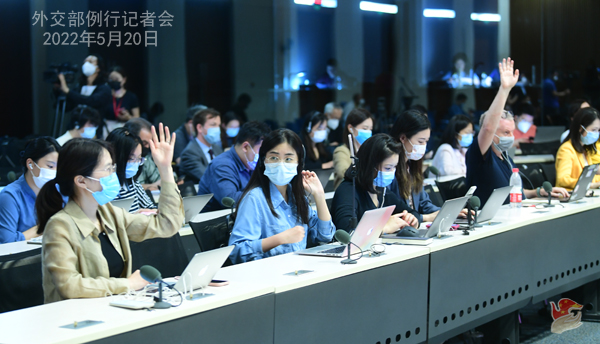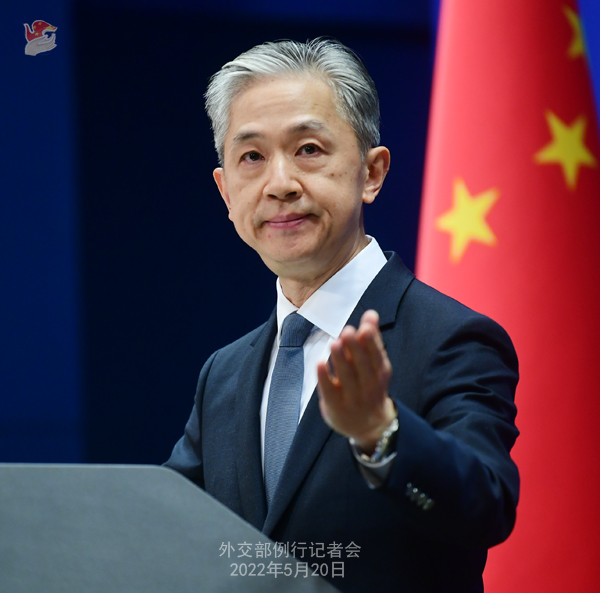
At the invitation of State Councilor and Foreign Minister Wang Yi, Pakistani Foreign Minister Bilawal Bhutto Zardari will pay an official visit to China from May 21 to 22.
Shenzhen TV: Foreign ministers of BRICS countries had a video conference yesterday. Can you share the outcomes of the meeting?
Wang Wenbin: On the evening of May 19, foreign ministers of BRICS countries held a video conference. President Xi Jinping delivered a video address at the opening session of the meeting. He noted that BRICS countries need to increase mutual understanding and trust, tighten the bond of cooperation, and deepen the convergence of interests. He also said BRICS countries should oppose hegemonism and power politics, reject Cold War mentality and bloc confrontation, work together to build a global community of security for all and contribute still more to the lofty vision of building a community with a shared future for mankind.
State Councilor and Foreign Minister Wang Yi hosted the video conference and elaborated on China’s position on strengthening BRICS cooperation. He said that BRICS countries should strive to find the common denominator of universal security, strive to draw “concentric circles” for common development, strive to build a firewall for human health and strive to pool positive energy of global governance. We should strive to translate the BRICS spirit of openness, inclusiveness and win-win cooperation into concrete actions, deepen the building of BRICS partnership and inject more BRICS strength into global development. State Councilor Wang Yi stressed that BRICS countries should further strengthen strategic communication and coordination and set an example of political mutual trust, further deepen mutually beneficial cooperation in various fields and set an example of pragmatic actions, and further demonstrate openness and inclusiveness and set an example of strength through unity.
Foreign ministers attending the meeting highly commended China’s active and effective work as the rotating chair, and noted that BRICS countries need to enhance solidarity and cooperation more than ever as the world is standing at a critical historical juncture. The foreign ministers released a Joint Statement on “Strengthen BRICS Solidarity and Cooperation, Respond to New Features and Challenges in International Situation”. In the Joint Statement, they reiterated their commitment to multilateralism, upholding international law and the purposes and principles of the UN Charter, respecting the sovereignty, independence, territorial integrity, equality and legitimate concerns of all countries, and to the central role of the United Nations in the international system. They called for efforts to enhance and improve global governance, respect democracy, and build a community with a shared future for mankind based on mutually beneficial cooperation. They reiterated the importance of ensuring equitable distribution of vaccines to fill the immunization gap globally and expressed support for the launch of the BRICS Vaccine Research and Development Center. They expressed support for origins-tracing based on scientific principles and opposition to stigmatization or interference. They called for accelerated implementation of the 2030 Agenda for Sustainable Development; urged major developed countries to adopt responsible economic policies and properly manage policy spillovers to avoid severe impacts on developing countries; expressed support for efforts to maintain a level playing field and refrain from unilateral actions and protectionist measures that run counter to WTO rules. They expressed support for talks between Russia and Ukraine and for efforts to provide humanitarian aid to Ukraine; committed to combating terrorism in all its forms and manifestations; reaffirmed their commitment to a world free of nuclear weapons, and noted the Joint Statement of the Leaders of the People’s Republic of China, the French Republic, the Russian Federation, the United Kingdom of Great Britain and Northern Ireland, and the United States on Preventing Nuclear War and Avoiding Arms Races, in particular the affirmation that a nuclear war cannot be won and must never be fought. They also voiced support for promoting the BRICS expansion process through discussion.
The virtual Meeting of the BRICS Ministers of Foreign Affairs/International Relations ended with consensus and positive outcomes on important issues bearing on global security and development, laying the political foundation for the 14th BRICS Summit.
Bloomberg: Can you talk a little bit about the BRICS expansion? For example, what would be the criteria for any new members to join? What countries would be potential new members? And have any countries in particular being approached with this potential of joining in mind? Is this something that has been agreed upon within the group?
Wang Wenbin: This is an important point. I just shared information on the video conference of BRICS foreign ministers hosted by State Councilor and Foreign Minister Wang Yi. Foreign ministers at the conference agreed that the strength of BRICS lies in its diversity and representation.
I would like to stress that BRICS has been closely linked to the destiny of emerging markets and developing countries since its establishment. At the foreign ministers’ meeting, it was also agreed that efforts should be made to expand the BRICS membership. This shows that BRICS cooperation is open and inclusive, BRICS members hope to deepen cooperation with other emerging markets and developing countries, and that the appeal of the BRICS mechanism is constantly increasing. BRICS countries will continue to enhance solidarity and cooperation with fellow emerging markets and developing countries to jointly safeguard our shared development interests and space.
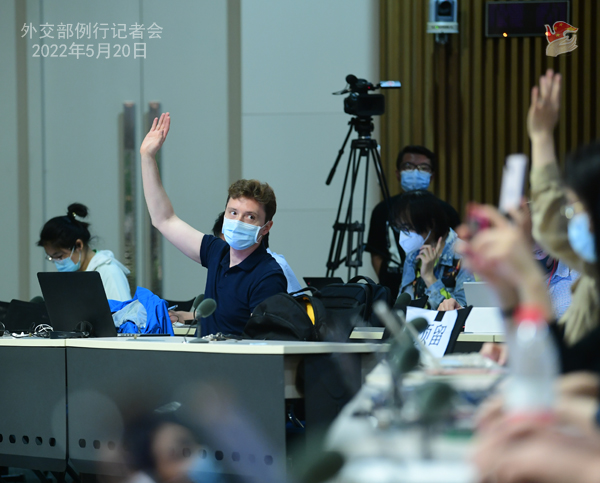
Al Jazeera: We have seen that Israel has refused to conduct a fair investigation into the case of Al Jazeera journalist Shireen Abu Akleh who was killed. Do you have any comment on this? Does China support a joint investigation of transparent and credible international institutions like most members of the international community?
Wang Wenbin: We have stated our position on this issue several times. China supports a thorough, transparent, impartial and just investigation into this incident and hopes it will be handled in accordance with law in a just manner.
I would also like to stress that lately there has been ongoing tension between Palestine and Israel with frequent violent clashes. China is deeply concerned over this. Both sides, Israel in particular, should stay calm and exercise restraint to prevent the situation from further deteriorating. The Palestine question is at the root of many issues in the Middle East. The underlying reason for the recurring tragedies of violence for violence between Israel and Palestine is the long denial of the Palestinian people’s legitimate appeal of establishing an independent state. The international community should take actions with a greater sense of urgency and work for the early resumption of peace talks between Palestine and Israel on the basis of the two-state solution, so as to achieve the comprehensive, just and lasting resolution of the Palestine question at an early date.
Xinhua News Agency: State Councilor and Foreign Minister Wang Yi also hosted the Dialogue of Foreign Ministers Between BRICS and Emerging Markets and Developing Countries yesterday. We noted that this is the first “BRICS Plus” dialogue at the level of foreign ministers. Could you share more with us on the outcomes of the meeting?
Wang Wenbin: On the evening of May 19, State Councilor and Foreign Minister Wang Yi chaired the Dialogue of Foreign Ministers Between BRICS and Emerging Markets and Developing Countries in a virtual format. It was attended by foreign ministers from BRICS countries, Kazakhstan, Saudi Arabia, Argentina, Egypt, Indonesia, Nigeria, Senegal and representatives of the foreign ministers of the UAE and Thailand. The “BRICS Plus” cooperation format, which was put forward by President Xi Jinping five years ago, has seen active response from various parties. This first “BRICS Plus” dialogue at the foreign ministers’ level is of great importance to further enriching and improving the relevance of BRICS and expanding BRICS countries’ cooperation with other emerging markets and developing countries.
State Councilor Wang Yi put forth a three-point proposal at the meeting. First, we should uphold multilateralism and firmly safeguard the international system with the UN at its core. We should oppose ganging up to form exclusive cliques and coercing other countries to take sides. China is ready to work with other parties for the implementation of the Global Security Initiative. Second, we should focus on development, stick to the main theme of common development and present a symphony of sustainable development. China stands ready to work with other countries to ensure the sound implementation of the Global Development Initiative with tangible deliverables and build a global partnership for development. Third, we should pursue win-win cooperation, deepen South-South cooperation, synergize development strategies, and work together to improve global governance so as to create greater space for development. China will always stand with the vast developing world and make unremitting efforts to build a community with a shared future for mankind.
Foreign ministers attending the meeting all expressed support for and approval of the “BRICS Plus” cooperation model, saying that it helps to promote solidarity and cooperation among emerging markets and developing countries and enable them to play a better role in international affairs and better safeguard the common interests of developing countries. All parties expressed their readiness to deepen strategic communication and coordination between BRICS countries and emerging markets and make global governance reform more just, equitable, inclusive and democratic.
The “BRICS Plus” foreign ministers’ dialogue has yielded outcomes and reached consensus in four aspects. First, support for promoting multilateralism and increasing the representation and say of emerging markets and developing countries in global governance. Second, support for cooperation in fighting COVID-19, including in vaccine and drug research and development, to help developing countries enhance their capacity to fight the pandemic. Third, support for the promotion of common development by putting development at the center of the international agenda and promoting the implementation of the 2030 Agenda for Sustainable Development. Fourth, support for strengthening solidarity and cooperation, seeking strength through unity among emerging markets and developing countries, and forging a broad partnership.
I would like to stress that the “BRICS Plus” cooperation mechanism is a platform for cooperation and development among emerging markets and developing countries. We welcome more countries to join us and work together for brighter prospects and a better future by promoting democracy in international relations, advancing inclusive world economy and improving global governance.
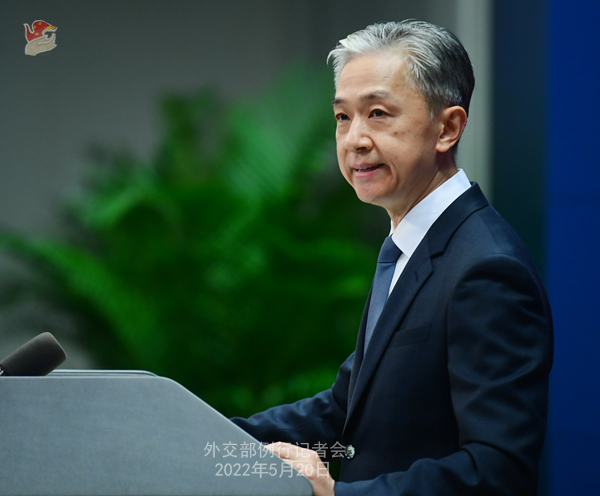
AFP: I’ve got a question on the DPRK and the situation regarding the COVID-19 outbreak. Can you update us on what kind of aid, what kind of help China is providing to the DPRK?
Wang Wenbin: There is a fine tradition of mutual assistance between China and the DPRK. Fighting COVID-19 is a common task faced by all humanity. China stands ready to work together with the DPRK and the rest of the international community with mutual support and stronger cooperation to secure a joint victory against the coronavirus.
Bloomberg: Sri Lanka’s former Finance Minister told the parliament earlier this week that the nation missed payments on debt due to Chinese banks. Later, its central banker said that Sri Lanka will not service its dollar debt until the country completed a debt restructuring. Can you give any update on China’s talks with Sri Lanka on the debt issue? How could this current situation affect China’s funding support for Sri Lanka going forward?
Wang Wenbin: China fully relates to the difficulties and challenges facing Sri Lanka and stands ready to play a constructive role in its steady economic and social development. As to Sri Lanka’s debt to the Chinese side, China supports relevant financial institutions in having consultations with Sri Lanka to seek a proper settlement. China stands ready to work with relevant countries and international financial institutions and continue to play a positive role in easing Sri Lanka’s debt burden and helping it achieve sustainable development. In the meantime, we hope and believe that Sri Lanka will work in the same direction and make independent efforts to uphold the legitimate rights and interests of foreign investment and financing partners, and maintain stability and credibility of its investment and financing environment.
CCTV: What is China’s consideration for inviting Pakistani Foreign Minister Bilawal to visit China?
Wang Wenbin: This visit to China is the first official bilateral visit of Bilawal Bhutto Zardari since he assumed the office of foreign minister. It will see his hope of taking China as the first destination of his official foreign visits realized and also marks the first in-person high-level interaction between the two countries since the new Pakistani government was formed. As all-weather strategic cooperative partners, it is necessary for China and Pakistan to strengthen communication and coordination on major strategic issues in a timely manner, and jointly respond to new developments in the international and regional situation and various risks and challenges.
State Councilor and Foreign Minister Wang Yi will hold talks with Foreign Minister Bilawal Bhutto Zardari to have comprehensive and in-depth exchange of views on bilateral relations and issues of common interest. China hopes to take this visit as an opportunity to renew our traditional friendship, consolidate strategic mutual trust, further deepen our all-weather strategic cooperative partnership and build a closer China-Pakistan community with a shared future in the new era.
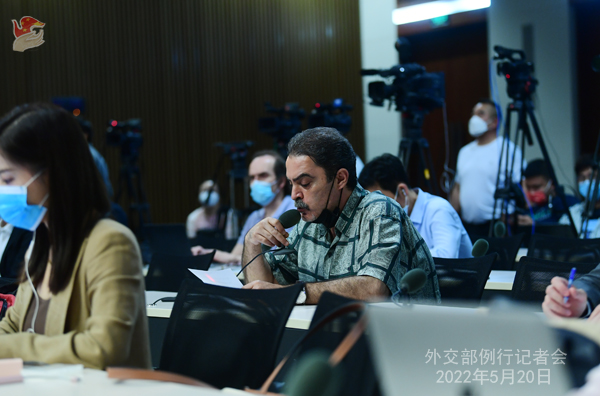
NHK: During his visit to Japan and the ROK, President Biden plans to hold a summit of the Quadrilateral Security Dialogue between the US, Japan, India and Australia, and announce the launch of the Indo-Pacific Economic Framework targeting China. Do you have any response?
Wang Wenbin: We noted that US National Security Adviser Jake Sullivan said the other day that President Biden’s upcoming trip to Asia is not aimed at confronting China. We hope that the US will match its words with deeds and work with countries in the region to promote solidarity and cooperation in the Asia-Pacific, instead of plotting division and confrontation. It should join efforts to foster an open and inclusive “circle of friends” in the Asia-Pacific, instead of putting together a closed and exclusive “clique”. It should do more to contribute to peace and development in the Asia-Pacific, instead of creating turbulence and chaos in the region.
China holds that any regional cooperation framework should conform to the trend of the times for peace and development and enhance mutual trust and cooperation among regional countries. It should not target third parties or undermine their interests, and should not be decidedly selective or exclusive.
AFP: Canada said yesterday it will ban Chinese telecommunications companies Huawei and ZTE from its 5G networks. So according to them, it’s due to national security concerns. Has China already expressed its dissatisfaction to the Canadian side?
Wang Wenbin: Without any solid evidence, the Canadian side cited unwarranted security risks as a pretext to exclude relevant Chinese companies from its market. This move violates principles of the market economy and free trade rules, and severely harms the Chinese companies’ legitimate rights and interests. The Chinese side is firmly opposed to it. We will conduct a comprehensive and rigorous assessment and take all means necessary to safeguard the Chinese businesses’ legitimate rights and interests.
Beijing Youth Daily: May 22 is the International Day for Biological Diversity. As the host country of the 15th Meeting of the Conference of the Parties (COP15) to the UN Convention on Biological Diversity, what efforts has China made to protect global biodiversity?
Wang Wenbin: China attaches great importance to biodiversity conservation and vigorously promotes ecological protection. China’s Ministry of Ecology and Environment (MEE) is holding an event to mark the International Day for Biological Diversity this afternoon. Sun Jinlong, Secretary of the Leading Party Members Group of the MEE, Xie Feng, Vice Foreign Minister, Wang Xiangang, Vice Governor of Yunnan Province, Li Chunliang, Deputy Director of the National Forestry and Grassland Administration, Ambassador of the European Union to China, Executive Secretary of the Convention on Biological Diversity and Resident Representative of the United Nations Development Programme in China, among others, attend and address the event.
As the host country of COP15 of the UN Convention on Biological Diversity, China successfully hosted the first phase of the conference last year. President Xi Jinping announced at the meeting China’s initiative to establish a Kunming Biodiversity Fund and take the lead by investing 1.5 billion RMB yuan to support biodiversity protection in developing countries, which has been highly commended by the international community. The Conference also adopted the Kunming Declaration, which provided political impetus for global biodiversity conservation. At present, China is actively preparing for the second phase of the conference and building consensus on the post-2020 Global Biodiversity Framework. China will continue to actively promote the green Belt and Road Initiative and the Global Development Initiative and advance South-South cooperation to contribute Chinese wisdom and strength to global environmental governance and jointly build a community of life on earth.
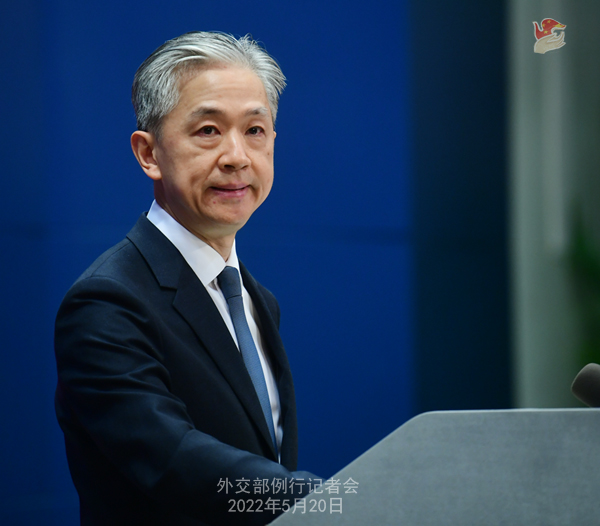
CCTV: According to a Yomiuri Shimbun report, a joint statement the US and Japan plan to release after talks on May 23 shows that the two sides are coordinating efforts to urge China to increase transparency with regard to its nuclear forces and to accelerate nuclear disarmament. Japanese Prime Minister Fumio Kishida, who was born in Hiroshima, will propose a cooperation framework for a world free of nuclear weapons. Content about US plans to expand nuclear guarantee to Japan in response to the threat it faces is also expected to be included in the statement. What is China’s comment?
Wang Wenbin: We have taken note of relevant reports. With the world’s largest and most advanced nuclear arsenal, the US, rather than earnestly fulfilling its nuclear disarmament obligations, is still investing heavily in upgrading its “nuclear triad”, developing low-yield nuclear weapons and lowering the threshold for using nuclear weapons. Besides, it continues to deploy global anti-missile systems and seeks to deploy land-based intermediate ballistic missiles in Europe and the Asia-Pacific. It is also trying to build military cliques with strong Cold War undertones by selling nuclear submarines and strengthening the nuclear umbrella. Such moves by the US severely undermine global strategic stability, peace and security and hinders the nuclear disarmament process. If the US is truly concerned about nuclear arms control, it should act in line with UN documents and international consensus, earnestly assume its special and primary responsibilities toward nuclear disarmament, continue to further substantively reduce its nuclear arsenal in a verifiable, irreversible and legally-binding manner, so as to make its due contribution to upholding global and regional strategic equilibrium and stability.
Japan, long presenting itself as a victim of nuclear weapons, vociferously advocates building a world free of nuclear weapons. At the same time, it sits comfortably under the US’ nuclear umbrella, and opposes and thwarts the US’ giving up its policy of first use of nuclear weapons. Japan’s position on nuclear disarmament is hypocritical and self-contradictory. Lately some Japanese politicians have been clamoring for “nuclear sharing” with the US in an attempt to breach Japan’s three non-nuclear principles and introduce US nuclear weapons. China and the international community are gravely concerned over this. Japan should be prudent with its words and actions, earnestly fulfill its obligations under the NPT, and adopt a responsible attitude in safeguarding regional peace and stability.
I would like to stress that China is firmly committed to a self-defensive nuclear strategy and keeps its nuclear forces at the minimum level required to safeguard national security. We stay committed to the policy of no first use of nuclear weapons. As long as a country does not use nuclear weapons against China, it has nothing to worry about China’s nuclear weapons. This is the most meaningful transparency.
Bloomberg: Bloomberg has reported that the Chinese and Russian governments are discussing more oil shipments, and that China will use the oil for its strategic reserves. Can the foreign ministry comment on this?
Wang Wenbin: I’m not aware of the specific situation you mentioned. To give you a principled response, China and Russia always engage in normal economic and trade cooperation on the basis of mutual respect, equality and mutual benefit. It needs to be stressed that unilateral sanctions are not conducive to resolving issues and will only sabotage the existing economic system and rules.
Bloomberg: I just like to double back on the BRICS. In your comments, you said that the appeal of BRICS has been improving. I just want to ask, given the current war with Ukraine, has the participation by Russia had any impact on the standing of BRICS?
Wang Wenbin: The BRICS foreign ministers exchanged views on regional hotspot issues including Ukraine and Afghanistan during their meeting yesterday. In their joint statement, they expressed support for talks between Russia and Ukraine as well as humanitarian aid for Ukraine. This is an objective and just voice that should be valued by the international community.
